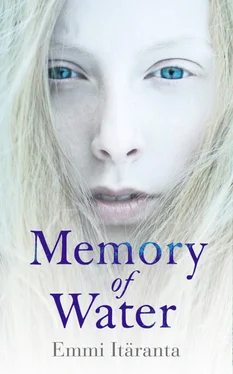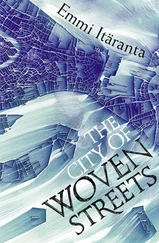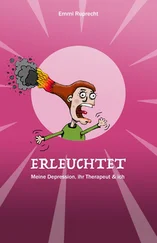Yet despite the passage of time and decay there was something in all of this that made me burn and flicker, as if my skin was suddenly too strained and the confines of my life too close, whichever way I turned. The Jansson expedition had really existed. They had lived and breathed, they had packed their fast past-vehicle full of food and water and scientific instruments, and somehow they had carried it all and themselves across the guarded border to the Lost Lands. They had climbed stony paths that no one else had walked in decades, and looked from the slopes of the fjords down to the drowned, water-weary villages. They had dipped their fingers in the brooks running from the cliffs and in the dark, ice-still lakes, and when their equipment had shown the water to be drinkable, every step on their way had acquired a purpose.
In my dreams I was with them, in this strange landscape, where the voice of water was ever-present. Yet I couldn’t see their faces or talk to them. They were in the background, out of reach, almost as if I was nothing but a bodiless spirit myself, held by a dark stream, unable to cross to the land of the living. Sanja was always next to me, and everything around us was lucid: the white fell-tips, the crisp air, the clear water mirroring the sky, bright and incomprehensible as another world, flaring with light.
The distance from dreams to words is long, and so is the way from words to deeds. Yet the more I listened, the shorter it grew.
The door slammed. Sanja walked into the workshop and placed a lukewarm cup of tea in my hand. A drop she had spilled travelled down the side of the cup and over my fingers.
‘I don’t think I can do more today,’ I told her. ‘Will you walk me home?’
This meant, of course, ‘Are you coming to get water?’ But we never said this aloud. It wasn’t planned. Talking about water had not turned awkward only between the two of us, but everywhere in the village. It was too easy to make the mistake of sounding like one was either boasting of one’s own water situation or begging for water from others.
‘I can’t today,’ Sanja replied. ‘Mum’s got work for this week in the army kitchen, I need to stay home with Minja. I’ll come tomorrow.’
‘Can’t do tomorrow. I have tea visitors coming.’
Sanja looked disappointed, but I knew it would be impossible for me to make time for her. The vice mayor of Kuoloyarvi was a demanding customer, and tea visits always filled the day from the crack of dawn until late evening. I couldn’t afford to lose more guests. Many of my father’s regulars had stopped coming after his death despite their condolences and assurances that of course they would keep visiting now that I was the tea master in the house. In my father’s time new clients had usually found their way to his ceremonies via Major Bolin’s recommendation, but Bolin seemed to have been right when he had told me his time as our benefactor was over. I hadn’t heard a word from him since my father’s funeral.
‘Can you come the day after?’ I asked, and Sanja nodded. I pulled the insect hood over my head, took my notebook and my bag and stepped through the mesh door into the dust-dry afternoon.
As I passed through the gate of Sanja’s house, I saw a soldier approaching from the outskirts of the village. I averted my gaze. Everyone in the village had learned to do so. However, when we passed each other on the road, he greeted me. I looked at him in surprise. It took me a while to recognise him: he was the same blond-haired soldier I had seen talking to Sanja last summer, when Taro had come with his people to search for water on our grounds.
I turned to the road winding out of the village. I saw from the corner of my eye that the soldier had stopped at Sanja’s gate.
The tea ceremony wasn’t the first one I had performed alone after my father’s death. I had learned to seek comfort in his invisible presence: memories of him were so solidly connected to the teahouse that it felt as if he was still seated there, watching my movements, ready to guide me without strictness. Yet this time my mind reflected him as a dark and serious figure, as if he knew. I replied obediently to the vice mayor’s questions about the picture hanging on the wall, I offered the tea sweets prepared according to particular instructions and I brewed the tea until it was strong, just as he wished. Still, the whole time I couldn’t descend to the peace that focus demanded.
A broken promise is not light to bear. It’s hard to please the dead, and sometimes harder not to do so.
The tea visit left me feeling drained. When I eventually locked the teahouse door late at night and walked into the house in the light of the blaze lantern, my limbs felt heavy and fragile as glass, and I was too weary to prepare supper. In the thin night-light of the early summer I fell into my bed and slept.
Knocking at the door woke me up.
‘Noria?’ I heard Sanja’s voice from the veranda. ‘Are you home?’
‘Just a minute,’ I called and scrambled to my feet.
I looked out of the window. The sun was shining brightly into the garden. I slipped my feet into my sandals and walked a little shakily to open the front door. Sanja was standing on the veranda, holding four empty waterskins bound together in her hand.
‘I sent you a message earlier,’ she said. ‘I thought maybe you forgot to reply, but I came as we agreed.’
I had completely forgotten that she was coming. I glanced at the message-pod on the wall. Indeed, the red light was flashing. I swept hair back from my face.
‘I didn’t hear anything,’ I said. ‘What time is it?’
‘Not that late,’ Sanja said. ‘Nine at most. I’m a bit early anyway.’
I opened the door wider and stepped aside. Sanja came in with her waterskins and removed her insect hood. I only noticed now that she was holding a mail pouch woven of seagrass, which she handed to me.
‘I ran into the mailman in the village. When he heard I was on my way here, he gave this for me to carry. Said it would spare him the walk.’
I took the mail pouch. Because I was certain it was from my mother, I opened it right away. Inside was a message-pod, slightly battered, but still in relatively good condition, and no letter of any kind.
‘Strange,’ I said, and Sanja’s expression revealed that she agreed. ‘Are you sure it is for me?’
‘That’s what the mailman said.’
I tried to switch the message-pod on, but the screen remained dark.
‘The battery must be empty,’ Sanja said.
I felt like a rustling, hollow shell, and realised I had not eaten since yesterday morning.
‘Would you like tea?’
Sanja nodded and followed me to the kitchen. I placed the message-pod on the windowsill, where it was in direct sunlight. It wouldn’t take long to charge. When the water was hot and the tea was steaming in the cups on the table, I put my finger on the message-pod screen. The display flashed. Sanja had been right. The screen switched on and the recogniser was reading my fingerprint. There was nothing unusual about this: all message-pods had been coded to recognise the user’s account or family account by the fingerprint, and in theory every registered citizen could use their account on any message-pod available. Yet the name that appeared on the display was not mine. Aino Vanamo , the message-pod announced. The birth year was the same as mine, but the date was not. The place of birth was recorded as Xinjing.
‘What is it?’ Sanja asked and got up from her seat to look at the message-pod. Her eyebrows rose when she saw the screen.
‘You try,’ I prompted. Sanja placed her finger on the screen. Sanja Valama , the display told me. I put my finger on the display again, and the identification for Aino Vanamo reappeared.
Читать дальше
Конец ознакомительного отрывка
Купить книгу












